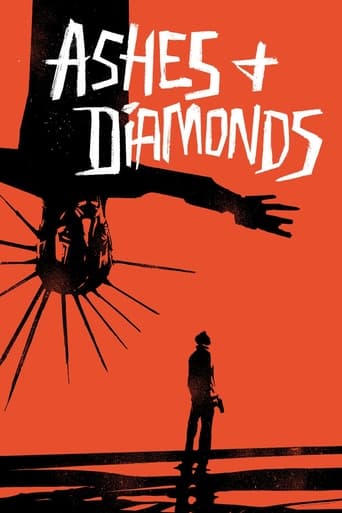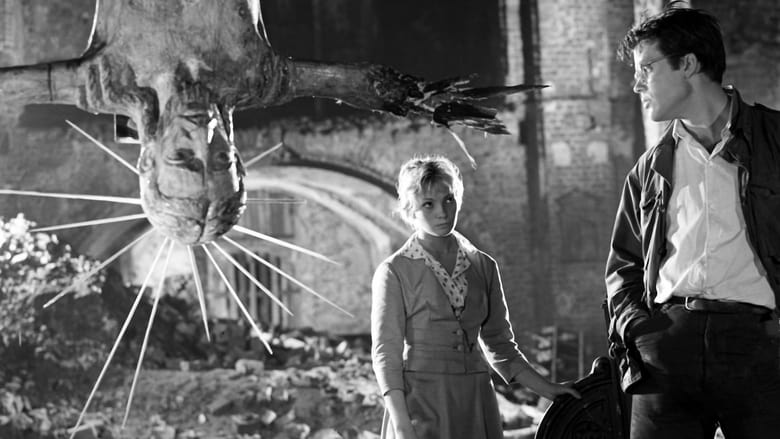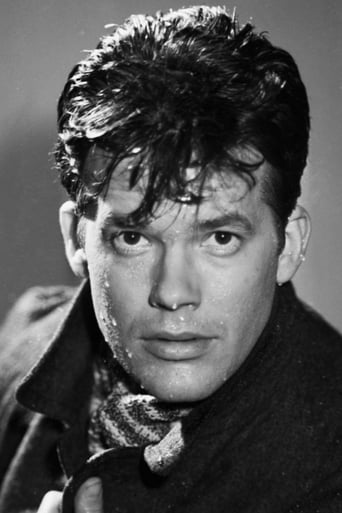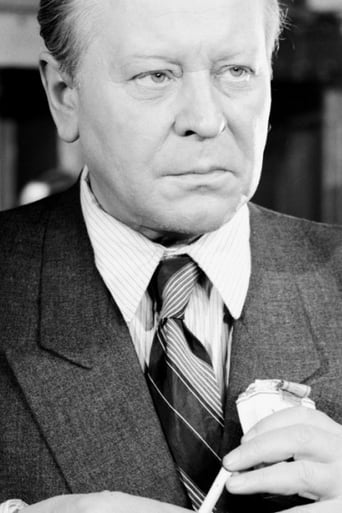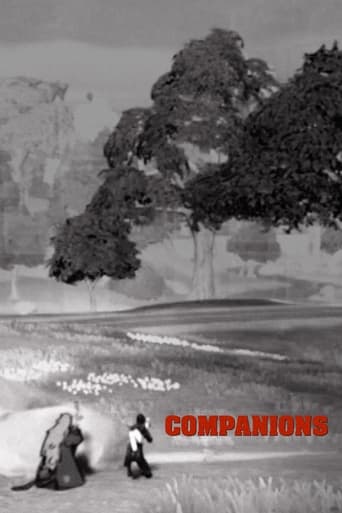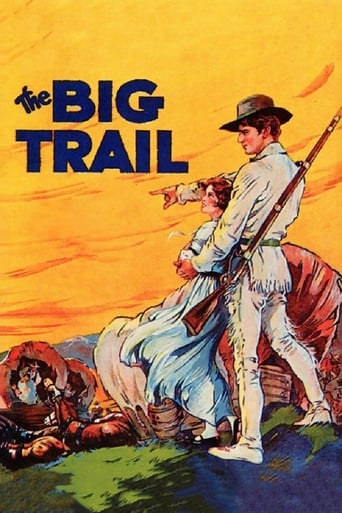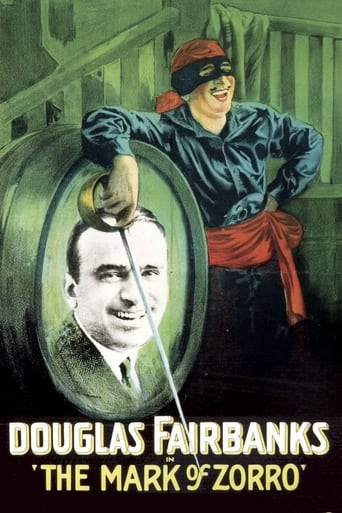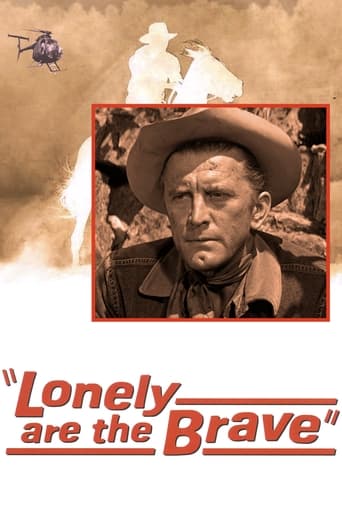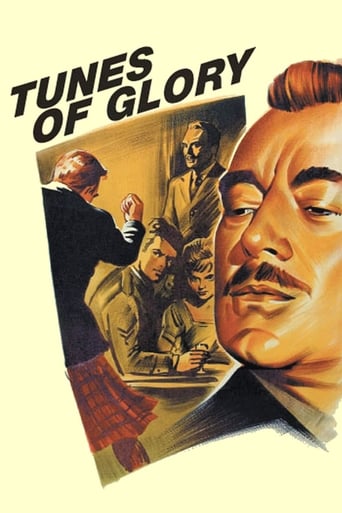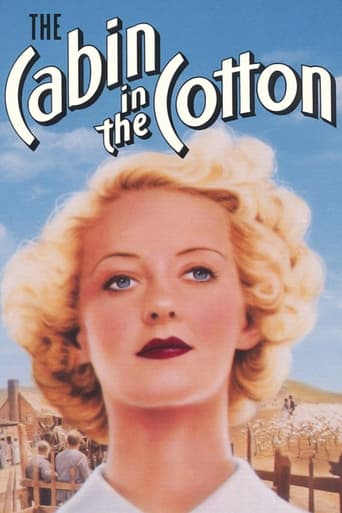Ashes and Diamonds (1958)
A young academy soldier, Maciek Chelmicki, is ordered to shoot the secretary of the KW PPR. A coincidence causes him to kill someone else. Meeting face to face with his victim, he gets a shock. He faces the necessity of repeating the assassination. He meets Krystyna, a girl working as a barmaid in the restaurant of the "Monopol" hotel. His affection for her makes him even more aware of the senselessness of killing at the end of the war. Loyalty to the oath he took, and thus the obligation to obey the order, tips the scales.
Watch Trailer
Cast


Similar titles
Reviews
Sadly Over-hyped
When a movie has you begging for it to end not even half way through it's pure crap. We've all seen this movie and this characters millions of times, nothing new in it. Don't waste your time.
The film's masterful storytelling did its job. The message was clear. No need to overdo.
It is an exhilarating, distressing, funny and profound film, with one of the more memorable film scores in years,
With WW2 ending, Poland finds itself in a period of transition and transformation. Millions have been uprooted, the country's infrastructure is in ruins, and there is uncertainty as to whether Russian Communists will move in to occupy the vacuum left by the departing Germans. Enter Maciek, a gunman who works for an anti-Communist faction. He's been tasked with assassinating Polish politicians sympathetic to the local communist party, which is what Andrzej Wajda's "Ashes and Diamonds" finds Maciek doing when it opens. His mission complete, Maciek then disappears to a neighbouring town, eager to learn his next assignment. What he learns, however, is something else: he's assassinated the wrong target. The rest of the film finds Maciek struggling to rationalise the killing of his fellow countrymen. The film's title encapsulates Poland's twin possibilities: destruction or prosperity. Maciek will not accept that the latter necessitates the former.The film plays like a pessimistic, very Eastern European take on "Cassablanca", most of the action taking place in bars, restaurants, shadows and over tables. This is a world rife with spies, communists, anti-communists, double-dealers, mercenaries, power vacuums, red herrings and characters who's loyalties constantly shift. Maciek's no Bogart, though. No cocksure American. He's a confused kid straight out of a 1970s Godard or Fassbinder movie, complete with big sunglasses and a part-time job as a terrorist. Hilariously, Maciek seems to never take off his sunglasses: his world is perpetually pitch black.The film's aesthetic, heavy with a type of symbolism typical of Wajda (upside down Christs, white horses which foreshadow Wajda's "Lotna" etc), tries to capture Maciek's own stormy, crisis of conscience. It's a noirish dark night of the soul. World War 2 has ended, Poland has survived, and yet why does she now find herself again at war? Why now are Poles killing Poles? How can Maciek justify killing his fellowmen? Today such moral dilemmas, as well as killing itself, has long been banalized down to nothingness. It's not that man no longer cares; man cares but does "it" anyway. The film ends with Maciek's own death, his blood stains forming the Polish flag, his body melting away into a field of garbage.Like many of Andrzej Wajda's films during this period, "Ashes and Diamonds" was a giant exercise in smuggling the artist's own political views past state censors. After WW2, Stalin created a communist, Soviet allied Polish state, officially dubbed "The People's Republic of Poland". As a part of the Eastern bloc, works of art in Poland deemed "oppositional" to both the Soviet Union and communism were firmly stamped out. And yet many of Wajda's films - though they tend to do this in a somewhat vague, elliptical way - are heavily critical of Polish politics and his local government's ties with the Soviet Union. Some authors have speculated that Poland's love for rebel archetypes and resistance fighters – local characters mythologised during WW2 - blinded censors to the "Ashes and Diamonds'" overall point: idiots, we're killing ourselves for Uncle Stalin!8.5/10 – "Ashes and Diamonds" is customarily thought of as being the second film in Wajda's "War Trilogy". The other films include "Kanal" (1957) and "A Generation" (1955). Worth two viewings.
During WWII, two ideologically-opposed factions, the London-directed Home Army and the pro-Soviet People's Army, joined forces to defeat a common enemy, the Nazis. When the war came to an end in May 1945, however, so too did the groups' shaky alliance, and from momentary peace was suddenly sprung a whole new struggle for power. While a new Communist regime began to build its foundations in the shell-shocked Polish cities, the remaining Home Army rebels took to the forests, where they dutifully continued their liberation campaign using guerrilla tactics. If WWII itself is considered necessary – or, if not necessary, then at least justified given the Nazi menace – then this post-War skirmish is the ultimate waste of life, prompting murder on the grounds of mere ideology. In Andrzej Wajda's 'Ashes and Diamonds (1958),' a weary Home Army youth, Maciek (Zbigniew Cybulski), faces an internal conflict between fighting political causes and living a normal life, not coincidentally the same dilemma facing the nation of Poland as the War came to a close.Wajda's film opens with an cold-blooded ambush, in which two concrete factory workers are needlessly gunned down in a case of mistaken identity. These shootings take place at the front steps of a country chapel, and with a child within earshot, highlighting the heartless resolve with which the Home Army rebels carry out their murders. However, despite the pro-Communist climate in which Wajda produced his film, he stops well short of demonising the "enemy" rebels, and, indeed, young Maciek is portrayed as the tragic victim of the story. In fact, the film goes to some length to emphasise the parallels between Maciek and Communist leader Szczuka (Waclaw Zastrzezynski), implying the needlessness of their conflict, and so the tragedy of their fatal opposition: both men fought valiantly against fascist dictatorships (the former in both Spain and Poland), and remember fondly the war comrades who died in pursuit of an ideal that, to both, should now be deemed realised. Instead, Szczuka dies in Maciek's arms as Poland celebrates its liberation.Polish cinema reached its peak in the late 1950s, following the Khrushchev Thaw that saw an ease in Soviet censorship, and Andrzej Wajda was at the forefront of this cinematic New Wave. Jerzy Wójcik's stark black-and-white cinematography is elaborate and beautifully-executed, capturing the main character's claustrophobic isolation using closed sets and a cramped frame. The war itself took many prisoners, but Maciek – ironically a "freedom fighter" – finds his freedom restrained in a less overt manner. Even with the liberation of Poland, Maciek is obligated to continue his blood feud, denied the ordinary happiness offered by a life with pretty bar-maid Krystyna (Ewa Krzyzewska), with whom he spends a night. Cybulski's character squanders most of the film in boisterous, overcrowded surroundings, finding room to move only in fractured moments, such as a late-night stroll through the crumbling town ruins. Even in his death throes, Maciek stumbles through a cluttered wasteland of garbage, ultimately joining the detritus of the twentieth century's most costly conflict.
When Germany surrendered in WWII on May 8, 1945 there was much celebration in the West, but the mood in Poland was not altogether jubilant - the Nazis had been defeated but the Soviet occupation was settling in for a long stay. The complexity of the political situation is reflected in this film but, short of having been there or studied the history, an encompassing understanding of the chaotic situation must remain incomplete I think. However, this film is a great example of how focusing on the lives of a few characters in a single twenty-four hour period can illuminate significant historical facts in the context of an intriguing story.The characters are representative of the factions existing in Poland on the day of the German surrender. You have: Maciek, a resistance fighter who had opposed the Germans and was continuing the struggle against the communists; Szczuka, a Pole who embraced the communists and had become a party official; Drewnowski, whose sympathies were with the resistance, but who hedged his bets by playing on both sides; people sucking up to the new power structure for purely personal gain; and most folks, who were just trying to get by.Moral ambiguities abound, raising issues with no easy answers. In an attempt to kill Szczuka Maciek mistakenly kills two innocent workers returning from a day of work at a local cement plant. Is continued resistance worth the sacrifice of innocent Polish lives? Maciek is conflicted about this and when Maciek's superior officer asks his superior if it is really necessary to kill Szczuka, he gets a resounding "Yes," followed by the question, "Is this the Poland you fought for?" Ordinary citizens bemoan the fact that any killing of Poles by Poles is wrong, but the very existence of the resistance shows that there is no universal agreement on that. Though Szczuka may be on the wrong side, he is not played as a villain and in fact he seems sincere in his convictions. You believe there is no evil intent when he says, "The end of the War isn't the end of our fight. The fight for Poland and what kind of country it is to become has just begun." Having met and become infatuated with the beautiful Krystyna, Maciek is torn between giving up on the resistance and pursuing personal goals. But his superior officer's implication that to do so would be traitorous to the cause resonates with him and, when he has an opportunity to kill Szczuka, he casts his lot with the cause he has fought for - a cause he knows is probably doomed, and will doom him. Better to die for a doomed cause you believe in than live a lie? Or, is it better to work within the system in trying to achieve heretical ideals?Zbigniew Cybulski is a quirky but charismatic actor. His unexpected facial expressions and body movements create a unique, memorable character. All the actors are good, and the melancholy score is perfect for the mood of the film - it is reminiscent of some of the more plaintive works of Nina Rota.A most impressive aspect of this film is the black and white cinematography. Every scene is artistically composed and there are many scenes that achieve a stunning effect, such as the one between Maciek and Krystyna in the ruined church with a life-sized crucifix hanging upside down and swaying to the sound of an eerie squeak, perhaps suggesting that the church had been turned on its head, or otherwise marginalized. The initial scenes also suggest the impotence of religion during this difficult time. When one of the innocent workers tries to escape Maciek's shots, he seeks refuge in a church, but the door is locked. After the door jam has been blown off the worker falls through the doorway, revealing a mangled crucifix inside.This film encourages one to do a little study of Polish history. Poland lost over five million civilians in the war, about three million of them Jews. This out of a population of thirty-five million. Poland also lost over 400,000 military personnel fighting for the allies, about the same number that the United States lost. Total U.S. casualties during the war accounted for about a third of one per cent of the total population, compared with a 16% loss of the Polish population. And, in the end, what Poland got for its sacrifice was a fifty year period of Soviet occupation. The segment of Norwid's poem that Maciek recites, "Will only ashes remain, and chaos, whirling into the void, or will the ashes hold the glory of a starlight diamond?" is particularly poignant in view of what happened.This film is in a league with the best black and white films of Bergman and Fellini.
This is not the film about "bad communists" and "good patriots". No, in this movie Wajda shows a deep tragedy of a Polish society split after the WWII. Some people like Szczuka are on the Soviet Side, some support anti-Russian guerrillas, but no one here is good or bad. The main hero, Maciek, is supposed to shoot that Communist activist Szczupak, but first he kills two innocent people by mistake, then he falls in love with a bar maid, then he finally kills his enemy, but gets killed too, and so - what is the outcome of his brutal killings? No result - many people are dead, no one is happy, the country is ruined and split, and the new ( and a very abominable elite) is drinking most disgustingly and dancing to a falsely played Polonez. The people who really awake disgust are those sly, heartless leaders of the country, not the sincere Szczupak or even cruel but unhappy Maciek. This is a deep, thoughtful film for all who do not hold on to stereotypes.

